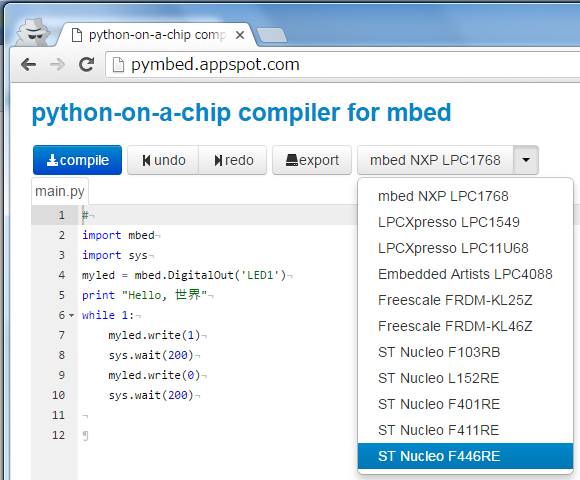python-on-a-chip online compiler
- http://pymbed.appspot.com/
- https://code.google.com/p/python-on-a-chip/
- http://www.youtube.com/watch?v=Oyqc2bFRW9I
- https://bitbucket.org/va009039/pymbed/
more info: python-on-a-chip
vm/tuple.h
- Committer:
- va009039
- Date:
- 2016-04-14
- Revision:
- 15:94ca5c8003e5
- Parent:
- 0:65f1469d6bfb
File content as of revision 15:94ca5c8003e5:
/*
# This file is Copyright 2002 Dean Hall.
# This file is part of the PyMite VM.
# This file is licensed under the MIT License.
# See the LICENSE file for details.
*/
#ifndef __TUPLE_H__
#define __TUPLE_H__
/**
* \file
* \brief Tuple Object Type
*
* Tuple object type header.
*/
/**
* Tuple obj
*
* Immutable ordered sequence. Contains array of ptrs to objs.
*/
typedef struct PmTuple_s
{
/** Object descriptor */
PmObjDesc_t od;
/**
* Length of tuple
* I don't expect a tuple to ever exceed 255 elements,
* but if I set this type to int8_t, a 0-element tuple
* is too small to be allocated.
*/
uint16_t length;
/** Array of ptrs to objs */
pPmObj_t val[1];
} PmTuple_t,
*pPmTuple_t;
#define tuple_copy(src, dest) tuple_replicate((src), 1, (dest))
/**
* Creates a Tuple by loading a tuple image from memory.
*
* Obtain space for tuple from the heap.
* Load all objs within the tuple img.
* Leave contents of paddr pointing one byte past end of
* last obj in tuple.
*
* The tuple image has the following structure:
* -type: S8 - OBJ_TYPE_TUPLE
* -length U8 - N number of objects in the tuple.
* N objects follow in the stream.
*
* @param memspace Memory space.
* @param paddr Ptr to ptr to tuple in memspace
* @param r_ptuple Return by reference; new filled tuple
* @return Return status
*/
PmReturn_t tuple_loadFromImg(PmMemSpace_t memspace,
uint8_t const **paddr, pPmObj_t *r_ptuple);
/**
* Allocates space for a new Tuple. Returns a pointer to the tuple.
*
* @param n the number of elements the tuple will contain
* @param r_ptuple Return by ref, ptr to new tuple
* @return Return status
*/
PmReturn_t tuple_new(uint16_t n, pPmObj_t *r_ptuple);
/**
* Replicates a tuple, n number of times to create a new tuple
*
* Copies the pointers (not the objects).
*
* @param ptup Ptr to source tuple.
* @param n Number of times to replicate the tuple.
* @param r_ptuple Return arg; Ptr to new tuple.
* @return Return status
*/
PmReturn_t tuple_replicate(pPmObj_t ptup, int16_t n, pPmObj_t *r_ptuple);
/**
* Gets the object in the tuple at the index.
*
* @param ptup Ptr to tuple obj
* @param index Index into tuple
* @param r_pobj Return by reference; ptr to item
* @return Return status
*/
PmReturn_t tuple_getItem(pPmObj_t ptup, int16_t index, pPmObj_t *r_pobj);
#ifdef HAVE_PRINT
/**
* Prints out a tuple. Uses obj_print() to print elements.
*
* @param pobj Object to print.
* @return Return status
*/
PmReturn_t tuple_print(pPmObj_t pobj);
#endif /* HAVE_PRINT */
#endif /* __TUPLE_H__ */
